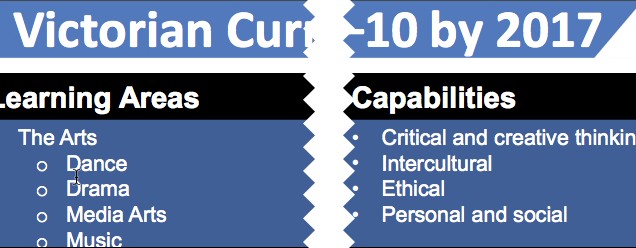
Every year the School Library Association of Victoria Awards are presented in recognition of the contribution of members and school leaders, and to encourage research into best practice. 2014 award recipients were announced at the conference, Building Communities through Reading, held at the National Gallery of Victoria in November. That’s a couple of months ago, I know, but it’s not too late to acknowledge these professional achievements.
Four awards presented were:
- The John Ward Award
- School Leader’s Award
- SLAV Innovator’s Grant
- SLAV Research Fellowship
Teacher Librarian, Leonie Dyason of Mooroopna Secondary College is a worthy recipient of the John Ward Award, presented in recognition of outstanding commitment to school librarianship in Victoria and named in honour of founding member of the Association, John Ward.
During her time at Mooroopna (commencing in 1977) Leonie has worked to support a less advantaged community developing a high level of understanding of, and responding to particular learning needs by creating a targeted print and ICT-rich collection that is educationally and culturally appropriate. Leonie has been a staunch advocate for school libraries and has been an active member of the School Library Association of Victoria during her long career.
She has been a driving force and support for colleagues in the SLAV Goulburn Valley Branch since the 1980s serving on SLAV Committee of Management and other committees within the Association. As a rural delegate, this has involved travelling from Mooroopna to Melbourne to attend meetings regularly. Commitment, dedication and collegiality have been a hallmark throughout Leonie’s teacher librarian career.
Congratulations Leonie!
____________
School Leaders are a critical component in the management and success of a school library. 2014 School Leader’s Award was presented to Marco DiCesare, Principal of Caroline Chisholm Catholic College, Braybrook and previously of Lavalla Catholic College, Traralgon. It was supported by commendations from Teacher Librarians, Barbara Roach (Caroline Chisholm Catholic College) and Jeananne Brown, (Lavalla Catholic College) both of whom have worked under the leadership of Marco. Barbara and Jeananne and acknowledge that he possesses cutting edge understanding of the role of the Information Services sector of the educational community. This leadership is influenced by his deep understanding of how students learn which enables him to see the intrinsic value of school libraries.
Marco has encouraged innovation and looked for ways the school library can embrace learning opportunities. He encourages collaboration between the library and other departments and sums up his expectation for the role of the Teacher Librarian as:
Teacher Librarians support and implement the vision of the College through advocating and building effective library and information services and programs that contribute to the development of independent, interdisciplinary lifelong learners. The Teacher-Librarian partners and collaborates with teachers in the development of curriculum and pedagogy and manages the library and information resources and services of the school.”
Congratulations Marco. The Principal is a key player in establishing the position of the school library within the school community.
____________
School libraries must be places of constant innovation and change responding to changing circumstances with new ways of working. Julie Purcell, Director Library Resource Centre at Ruyton Girls’ School and David Feighan, Information and Library Services Manager, Mentone Girls Grammar School were co-recipients of the SLAV Innovator’s Grant of 2014. The Grant was awarded in recognition of David and Julie’s work in initiating and setting up a shared ebook collection across two schools that are not under the same governing body nor in the same vicinity.
This project is innovative as it leads the way in inter school co-operation and enables both schools to offer larger, richer and more engaging ebook collections to their students. It also demonstrates that two schools located some distance apart, with different library catalogue systems and no shared IT network, can still work effectively together. Well done!
____________
SLAV Research Fellowship for 2014 was awarded to teacher librarian, Amanda Baker, to allow her to further develop and extend the range of Reading Programs she has developed across Viewbank College, and which could serve as a model for other teacher librarians to follow.
Amanda’s presentation of her work to delegates at the conference was enthusiastically received. She illustrated that by working closely with English staff in the Middle Years, the Viewbank College Library has managed to build a thriving reading community. Activities such as the ‘Million Word Challenge’ and ‘The Reading Portfolio’ have increased student engagement, encouraged conversations about reading and increased involvement. In addition to supporting literacy outcomes, this reading model has strengthen the relationships between Teacher Librarian , the English faculty and other staff and supports a reading culture across the school.
Congratulations Amanda, we look forward to hearing more about your work.
Recognising exception practice within the profession is important. Whilst rewarding merit, it highlights exemplary practice and stimulates improvement. Watch out for the invitation to nominate candidates for 2015 awards later in the year. Share the best practice that’s occurring within your school community.





